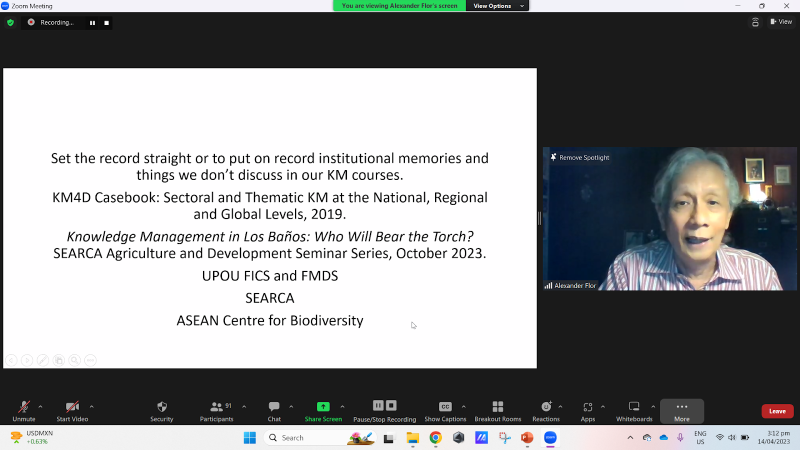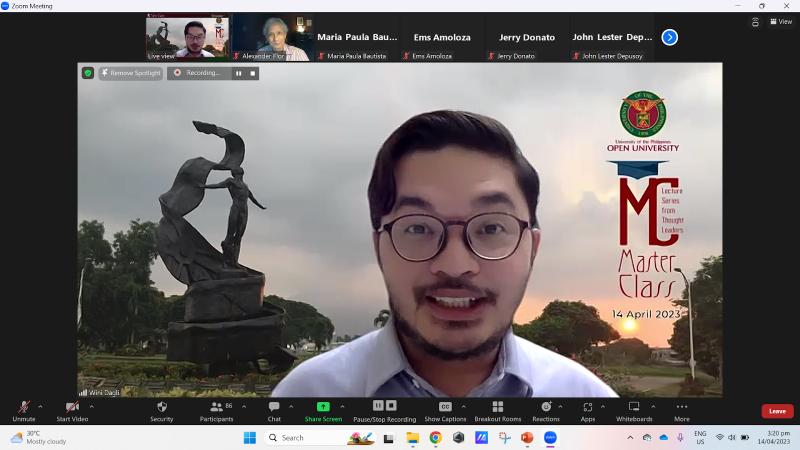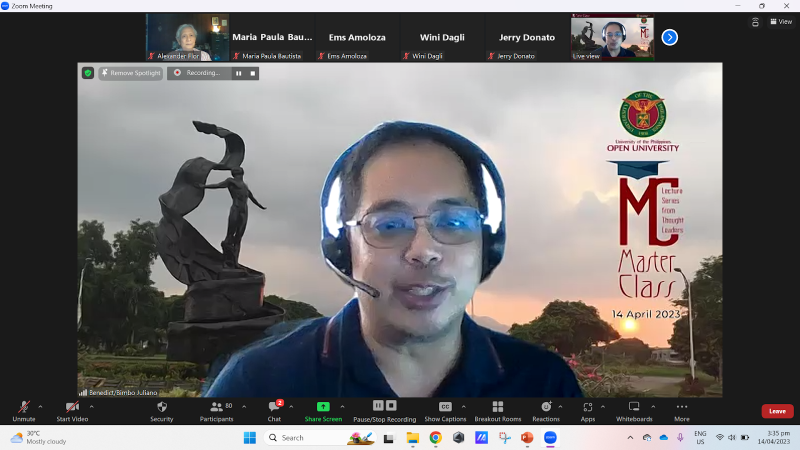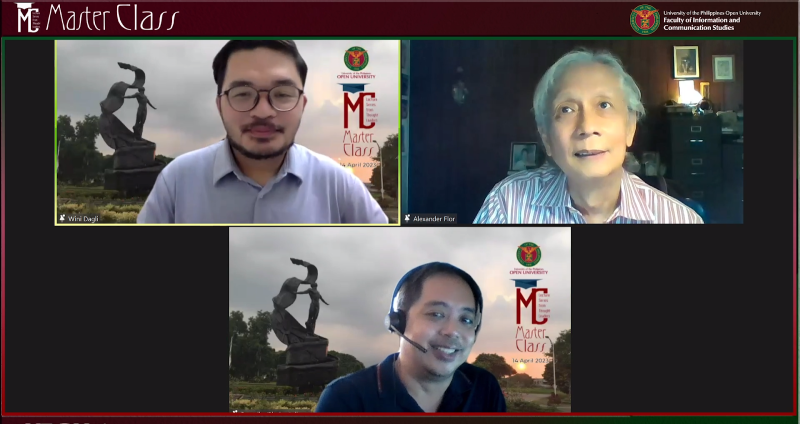
The University of the Philippines Open University (UPOU) Faculty of Information and Communication Studies (FICS) held a Masterclass entitled, “KM4D Revisited: Backstories on the Los Baños Brand of Knowledge Management,” on 14 April 2023 with Dr. Alexander Flor as Thought Leader. Assistant Professor Winifredo Dagli from the University of the Philippines Los Baños (UPLB) College of Development Communication (CDC) and Mr. Benedict Juliano from the London Stock Exchange Group’s KM Content Strategy and Editorial also provided additional insights as Reactants. It was held via Zoom and live-streamed through UPOU Networks, Facebook, and Youtube.
The event began with Mr. Jerry Donato, the co-project proponent of the Masterclass, giving a brief background on the event, which FICS first started organizing as an extension activity in 2018. Back then, he was the President of the UPOU Alumni Foundation, Inc. (UPOUAFI) and the FICS Masterclass was organized in partnership with them. He narrated its humble beginnings, focusing on why the need for such an activity arose and how its main goal is to preserve and capture the knowledge of thought leaders for future reference and usage.
Dr. Flor’s lecture chronicled the history of KM4D from his perspective, how it was introduced in higher education, and his outlook on how KM4D can transform going forward. He prefaced his lecture by sharing his open-access book entitled, “KM4D Casebook: Sectoral and Thematic Knowledge Management at the National, Regional, and Global Levels,” which documented the KM4D projects and undertakings he was involved in since the late 1990s. The open-access book, which can be downloaded through the UPOU Repository, would serve as a good resource for anyone who wished to understand more about KM4D.
He began his talk by posing a question he hoped participants could ponder throughout his talk: Knowledge Management in Los Banos: Who Will Bear the Torch? He then proceeded to discuss the origins of KM4D and how he got involved in the field, stressing that the concept of horizontalization, which bridges knowledge gaps for the benefit of the people in the Global South, was the main reason for the conception of KM4D.
According to Dr. Flor, it could all be traced back to the East-West Center from 1989-1993, wherein his exposure to his mentors and their specializations led to his 1993 publication, “The Information of Agriculture” in the Asian Journal of Communication. He added that the late professor, Dr. Felix Librero, had a huge hand in the early beginnings of KM. It was also he who inspired Dr. Flor’s practice related to the informatization and knowledge age.
Later in his career, when Dr. Flor tackled sectoral and thematic KM while under the Information Resources Development Program of the Southeast Asia Research Center for Agriculture (SEARCA), he did KM not for the organization, but for the natural resources management sector. He emphasized how it had a marked difference from conventional KM frameworks proposed in 1995 which only dealt with corporations, private entities, and profit-making institutions.
In 1998, KM was first approved and introduced as a course under the UPLB CA Institute of Development Communication. DEVC 152: Principles of Knowledge Management was offered as a lecture-lab course under the Science Communication Cluster, which showed how, as early as then, KM was being applied to the projects.
Recognizing the importance of KM, in 2004, the Asian Institute of Journalism and Communication (AIJC) started to offer a KM certification course – the course outline of which was developed by Dr. Flor. This course outline was then used by Dr. Ramon Tuazon, who was at the time the AIJC President and a member of the CHED technical panel for communication education, to introduce KM into the curriculum of nationally-offered communication degree programs. Dr. Flor credits him for being instrumental in introducing and mainstreaming KM in higher education.
Lastly, Dr. Flor discussed KM4D courses and projects that have been part of or related to the BAMS and DCOMM programs of UPOU since 2010. He also highlighted the development of the typology of conventional KM versus KM4D in terms of purpose, considerations, thrust, levels of utilization, system functionalities/applications, and content.
Wrapping up his talk, Dr. Flor shared his outlook on the future of KM4D and the possibilities of reimagining it, citing the UPOU Faculty of Management and Development Studies (FMDS) and the ASEAN Centre for Biodiversity (ACB) as possible collaborators. He also shared new competencies that are needed for knowledge management specialists who work in development agencies, core elements of sharing and reuse, and proposed updated KM4D functions and/or terms of reference. “We are in the position to frame up KM4D as a separate science,” he said.
Tying everything back to the FICS Masterclass, he ended his talk by reiterating the intention of the FICS Masterclass, which was to set the record straight or to put on record institutional memories and things that were not discussed in KM courses. Going back to the question he posed at the beginning of his lecture, he asked, “Who shall bear the torch for KM in Los Baños?”
After Dr. Flor’s lecture, Reactants Asst. Prof. Winifredo Dagli and Mr. Benedict Juliano also shared their thoughts. Coming from different backgrounds, academe and corporate, respectively, they supplemented Dr. Flor’s lecture and were able to have a well-rounded discussion.

Assistant Professor Winifredo Dagli started by going on a trip down memory lane during his undergraduate years as a DEVC 152 student under Dr. Flor. He shared how Dr. Flor’s mentorship influenced his career path. “Siguro, Sir, you planted a seed on me to pursue a career in KM because after I graduated from college, I didn’t really pursue conventional communication media work,” he said.
Imparting new knowledge on the topic of conventional KM versus KM4D, he shared that in the academe, “knowledge creation” is now termed as “a coproduction of knowledge”. He also highlighted the potential of KM4D to engage power holders or to reframe power by associating it with Donella Meadows’ Leverage Points System framework, which identified knowledge as one of the deep leverage points to generate system change. Lastly, he agreed with Dr. Flor that there’s a need to 1) consider more transformative forms of learning and 2) bridge organizational KM and external KM.

Mr. Benedict Juliano began imparting his insights by first sharing his gateway into KM, which was through technical writing way back in the 2000s. According to him, it was his German boss who told him, through a piece of paper, that what he was doing was KM all along.
Stressing his exposure to KM as mostly corporate KM or KM profit, he provided an alternative perspective on the topic, saying he cares more about the products and impacts rather than the creator of the knowledge. He emphasized that there is a cost in managing and sharing knowledge and that for it to be sustainable, any organization has to be aware of how it can benefit from it. He further added that there should be success measures once the effort is done.
“You never do a KM initiative, project, or activity without thinking about what you are going to achieve,” he said.
In response to the Web Paradigm shifts discussed under the topic Conventional KM vs KM4D, Mr. Juliano put forth an amendment to the thought that corporate KM is only for internal uses. According to him, corporate KM also has external uses, such that external customers benefit from the KM rather than just internal people or internal systems.
Afterward, he discussed some aspects of the emerging trends: ChatGPT and AI. Despite the potential of these trends, he stressed that KM still needs 3 Ps: People, Processes, and Platforms. Overemphasizing just one of them will not be sustainable. Lastly, he believes that there is room for KM4D as it is one of the ways that development organizations can make sure their efforts and outputs are appreciated by the next generations.

After the reactants shared their thoughts, a short open forum was facilitated by Dr. Emely Amoloza. Dr. Flor, Asst. Prof. Dagli and Mr. Juliano responded to participants’ questions using different lenses based on their different exposures to KM.
Dr. Amoloza formally ended the Masterclass by giving a summary of the topics discussed. She also answered Dr. Flor’s question of who will bear the torch for the KM in Los Baños by saying the challenge was rather put on all of the people watching the event and all those who realized how important it was to capture knowledge so that it can be shared and reused to achieve sustainability and development.
Overall, the Masterclass was an informative and thought-provoking event that provided insights into the history of KM4D, specifically the Los Banos brand, its current state, and future possibilities. It was an excellent opportunity for the participants to learn from experts and academics in the field of knowledge management. The Masterclass also highlighted the importance of capturing and preserving institutional memory and knowledge for future reference and usage. A quarterly event organized by FICS, the Masterclass is a series of lectures given by experts and academics from the fields of development communication, mass communication, and communication. It thrives in the spontaneous exchanges of ideas or knowledge transfer and continues the tradition that such thinkers as Noam Chomsky, Michel Foucault, and Jacques Derrida had started in giving expert discussions to the public.
Written by Maria Paula Bautista
Edited by Patricia Calora
Contributed by the UPOU Faculty of Information and Communication Studies








